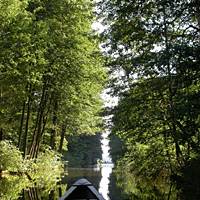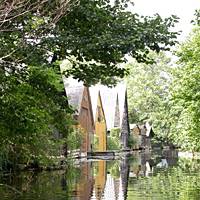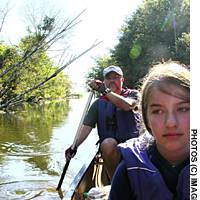These days, "eco" has become something like a random, loosely attached, brand name. Not associated with any particular company, nor with any particular product, eco -- which "Webster's" defines as a combining form meaning "environment or habitat" -- is applied seemingly indiscriminately.
Yet, though it is now often detached from "ecology" or "ecosystem," eco still retains a universal sense of wholeness, and appropriateness; in short, it is taken (perhaps more subliminally felt?) to be a good thing.
However, I have found "eco" prefixing such an increasingly wide range of terms over the last 20 years that I have lost track of its true meaning -- or, should I say, its intended meaning.
In Hokkaido, where I live, there is an eco-road; worldwide there are ecotours. Attach eco to a word, marketing types appear to think, and it implies a good product.
This inability to tie down the true meaning of eco in the public's mind comes at a time when the term has proliferated globally from Ecuador to Egypt, from South Africa to Switzerland. It crops up in so many languages, and, in each, has perhaps been given its very own spin.
Just what, for example, does eco-road mean in Japanese? How can visits to an orchid greenhouse be described as ecotourism? -- but I found that concept as well on a Japanese Web site.
I have been involved in the special-interest tourism market for more than 25 years, and much of what I participate in some would call ecotourism. I even lecture on the topic of ecotourism, despite having rather lost sight of what it might actually mean.
For some, it includes any aspect of interest in nature, yet that blends all too easily with mass tourism -- witness the rows of buses at sites with cranes in Kyushu or swans in Hokkaido.
No global standard
For others, it includes adventure tourism such as horse riding, ballooning and so on. Purists want it to be low impact, generating income locally and supporting conservation, while being educational too.
As there is no global standard, no benchmark to measure providers against, consumers are largely left to make up their own minds (or not bother at all) about what is or is not ecotouristic.
At base, though, the image the concept of anything with the eco tag projects, whether a road or a tour, is surely that it is good for the environment, as opposed to all those bad things out there.
I have been on Russian icebreakers in the Arctic and expedition cruise vessels in Antarctica that made use of helicopters to ferry us ashore, to scout for sea ice, and for "flightseeing." I have led wildlife-watching trips from Finland to the Falkland Islands, from Antarctica to Alaska, and from Chukotka to Chile. Most of these ecotours involve flying participants to far-flung destinations, involving jumbo jets and jet fuel, and even if we choose to travel to a more modest local destination, we may depend on a car to get there.
None of these modes of travel can surely be considered good for the environment! Yet compared with jet-skiing, powerboating, road trips, mass coach tourism and package holidays, they are certainly lower impact, more educational, with a much more strongly nature-focused intent.
I have recently experienced something perhaps more closely akin to a real ecotour than any other form of travel I have been involved in. Even then it necessitated a long car ride from Britain, where I was visiting at the time, to northern Germany, on that country's notoriously fuel-draining autobahns. Nevertheless, once embarked upon, it was about the lowest-impact tour I have ever made.
For 11 days, from Priepert to Fleeth, the pace of movement was little faster than walking; one whole day was spent on foot, another involved a journey in a horse-drawn coach -- and the rest was all undertaken by Canadian canoe.
For the uninitiated, a canoe differs from a kayak in that the latter is narrow and enclosed; a canoe is broad, long and open -- ideal for carrying several people and large amounts of gear. In the case of my latest adventure, the 6-meter-long craft carried a family of three, our food and camping gear in an unexpected degree of comfort. The motive power for such a holiday is neither aviation fuel nor gasoline, but willpower and muscle power (my shoulder muscles have never been so well-defined before!). And with each night spent under canvas beneath the trees of rural campsites, our environmental impact was about as low as we could make it.
The venue for this eco-adventure was the 322-sq.-km Muritz National Park, established only in October 1990, almost immediately after the reunification of Germany. It incorporates an astounding series of lagoons, lakes, ponds, rivers and channels set in a densely forested, rural landscape.
The shallow waterways and low, sandy undulating hills of this region 100 km northwest of Berlin owe their origins to the retreat of the great glacial sheets that once covered this part of Middle Europe. In their wake they left glacial sand, erratic boulders, and an array of lakes.
Ecological succession over the 12,000 or so years since then has seen tundra retreat north, leaving the region to now support towering pine, beech, and oak woods, while fringing the waterways are willows, alders and reed beds.
In this realm of water and woodlands, walking, cycling and canoeing are the gentler forms of travel, and provide the keen-eyed observer with many chances to make some stunning wildlife sightings.
Electric-blue flash
Never before have I seen so many kingfishers in such a short space of time. These piscivorous birds haunt the margins of the lagoons, perching in the low alders and revealing themselves only when they move and you see the electric-blue flash of their backs and the burned orange of their breasts as they fly fast and low and straight across the water.
Overhead, meanwhile, red kites soared, while out on the water the sleek forms of great-crested grebes were ever present.
During one of our quiet early morning paddling sessions, an osprey plunged repeatedly into the lake nearby until it eventually flew off carrying its prize catch slung beneath in its talons.
Wild flowers, butterflies, birds and grass snakes were all abundant, but it was the presence of the cranes that made the trip especially memorable for me. At night, we heard their wing beats overhead; during the day we would hear their distant, bugling calls.
As well, our occasional sightings of drifts of them heading southward overhead were reminders that while we paddled a mere 100 km or so on our "adventure," they were, under their own steam, traveling thousands of kilometers from Scandinavia to Spain.
If it is ecotourism that attracts you, then I heartily recommend attempting something under your own steam, whether on foot, by bicycle or on the water. The slow and steady pace, the sense of achievement -- and the opportunity to be close to nature -- are all tremendous rewards. And there is no need to visit an exotic foreign destination to experience this, as Japan abounds with mountain trails and remote corners and it just takes willpower -- and a little muscle power -- to reach them!




















With your current subscription plan you can comment on stories. However, before writing your first comment, please create a display name in the Profile section of your subscriber account page.